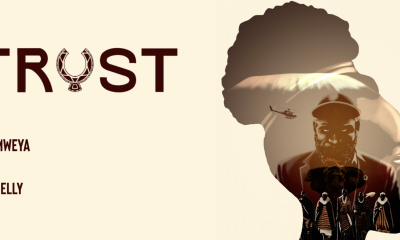In this week’s news roundup, you’ll read about Binance becoming the official sponsor of the AFCON 2021 tournament in partnership with CAF, GoldFinch, a DeFi platform has successfully raised $25 million to continue offering uncollateralised DeFi loans, and other top crypto stories.
Binance Becomes Official Sponsor of the AFCON 2021
Binance announced that it has partnered with the Confederation of African Football (CAF) to become the official sponsor of the TotalEnergies Africa Cup of Nations (AFCON) tournaments 2021.
 The famed football event will take place in Cameroon from January 9 to February 6, 2022. This sponsorship marks the first time the crypto exchange will sponsor a large-scale football event.
The famed football event will take place in Cameroon from January 9 to February 6, 2022. This sponsorship marks the first time the crypto exchange will sponsor a large-scale football event.
Speaking of the partnership, CAF’s General Secretary, Veron Mosengo-Omba, said, “I am delighted to welcome Binance as an official sponsor of the AFCON tournament this year. Through this partnership with CAF, Binance will connect further with its users and the African community through football. CAF is ready to embrace blockchain-based technology and its impact on the future of African football development. I am certain that together with Binance, we can take African football to a new level.”
Besides the sponsorship, Binance will also become the official partner of the Assist of the Day / Binance Assist of the Week / Binance Assist of the Tournament, which CAF will promote across its social media channels including Facebook, Instagram, TikTok, Twitter, as well as across six venues in five different cities in Cameroon. Additionally, the tournament will be broadcast live in over 160 nations and is expected to have an audience of more than 300 million.
The partnership will also allow Binance to continue its mission of championing financial freedom for Africans while driving blockchain adoption.
DeFi Platform, GoldFinch, Raises $25 Million to Provide Uncollateralised DeFi Loans
GoldFinch, a decentralised credit platform that helps expand the pool of potential lenders beyond banks, has successfully secured a $25 million funding round that will help it continue to provide uncollateralised DeFi loans to businesses in emerging markets.
GoldFinch’s protocol runs as an open marketplace for loans and eliminates the need for any kind of collateral thus decentralising the loan underwriting process. Additionally, it makes off-chain sources of yield available and composable on DeFi.
The funding round was led by Andreessen Horowitz – known as a16z – a venture capital firm that invests in seed to late-stage technology companies. The funding round also saw new investors participate including Bill Ackman, Blocktower, Kingsway Capital, Helicap, YC Alumni Fund, Jinglan Wang, MSA Capital, among others.
Currently, GoldFinch’s protocol is serving more than 200,000 borrowers in 18 countries around the globe and plans to use the funds to achieve its mission of expanding financial inclusion using an open credit protocol.
82% of Small Businesses Plan to Start Accepting Digital Payments in 2022
 A new study done by Visa, a world leader in digital payments, dubbed ‘Visa Global Back to Business Study – 2022 SMB Outlook’ has found that 82% of small businesses plan to accept digital payment in 2022.
A new study done by Visa, a world leader in digital payments, dubbed ‘Visa Global Back to Business Study – 2022 SMB Outlook’ has found that 82% of small businesses plan to accept digital payment in 2022.
The study also found out that 46% of consumers surveyed want to use digital payment options more in 2022 compared to only 4% who said they would use them less. The study surveyed 2,250 small business owners and consumers across nine different markets.
Moreover, 73% of small businesses surveyed said accepting new forms of digital payments is crucial to their business growth in 2022.
24% of all businesses surveyed said they plan to accept cryptocurrencies such as Bitcoin for payment of goods and services.
“Payments are no longer about simply completing a sale. It’s about creating a simple and secure experience that reflects one’s brand across channels and provides utility to both the business and its customer,” said Jeni Mundy, Global Head Merchant Sales & Acquiring, Visa.
Blockchain Research Institute Partners with Standard Bank to Expand its Work in Africa
The Blockchain Research Institute (BRI), a global blockchain think tank, has partnered with Standard Bank, Africa’s largest bank by asset, to expand its work in the African continent.
The partnership has introduced BRI Africa, which will bring together academics, entrepreneurs, policymakers, and researchers to undertake research on blockchain technology. BRI Africa aims to bridge the gap between the real market need and the technical functionality of the blockchain.
The research institute will also work to distribute knowledge gathered across the country by providing a wide range of educational deliverables in the form of books, conferences, and webinars. The online courses will be delivered by BRI in partnership with Coursera and INSEAD. Additionally, BRI will also foster business ideas that revolve around blockchain technologies via the Africa Blockchain Program. According to BRI Africa, the program is currently open for Egypt and Zimbabwe and will provide resources for new founders to use to launch and scale a startup.
To learn more about Bitcoin, download the Bitcoin Beginner’s Handbook for free.


 Features3 years ago
Features3 years ago
 Bitcoin2 years ago
Bitcoin2 years ago
 Features3 years ago
Features3 years ago
 Features3 years ago
Features3 years ago
 Features3 years ago
Features3 years ago
 Features3 years ago
Features3 years ago
 Features8 months ago
Features8 months ago
 Bitcoin10 months ago
Bitcoin10 months ago

 The famed football event will take place in Cameroon from January 9 to February 6, 2022. This sponsorship marks the first time the crypto exchange will sponsor a large-scale football event.
The famed football event will take place in Cameroon from January 9 to February 6, 2022. This sponsorship marks the first time the crypto exchange will sponsor a large-scale football event. A new study done by Visa, a world leader in digital payments, dubbed ‘Visa Global Back to Business Study – 2022 SMB Outlook’ has found that 82% of small businesses plan to accept digital payment in 2022.
A new study done by Visa, a world leader in digital payments, dubbed ‘Visa Global Back to Business Study – 2022 SMB Outlook’ has found that 82% of small businesses plan to accept digital payment in 2022.


















 Central African Republic (CAR) has set up a 15-member committee that will be responsible for developing a bill on the use of cryptocurrencies and tokenization in the region.
Central African Republic (CAR) has set up a 15-member committee that will be responsible for developing a bill on the use of cryptocurrencies and tokenization in the region.
